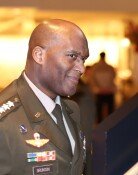U.S. considers withdrawing its forces from overseas bases
U.S. considers withdrawing its forces from overseas bases
Posted July. 20, 2020 07:56,
Updated July. 20, 2020 07:56
The U.S. Department of Defense suggested options to withdraw overseas U.S. troops including the U.S. Forces in Korea (USFK) in March, U.S. media reported on Friday. Cautious about reading too much into it, a South Korean military official said it was intended to put pressure on Seoul to shoulder more costs for the upkeep of U.S. soldiers in South Korea.
To be sure, this is not the first time Washington threatened to cut U.S. forces in Seoul. U.S. President Donald Trump who puts money before an alliance has suggested the possibility to withdraw U.S. troops in every defence cost sharing discussion. However, redeployment is not a distinct possibility as seen in the withdrawal of 9,000 U.S. troops in Germany, which were redeployed to Poland last month.
U.S. Secretary of Defence Mark Esper said in “NDS Implementation: First Year Accomplishments,” which was published on Friday, that he would start reviewing the redeployment of U.S. troops in several commands including Indo-Pacific Command within months. This indicates that downsizing USFK is not merely a threat.
The cost sharing negotiations have been in stalemate after President Trump turned down Seoul’s offer to increase its contribution by 13 percent. The impasse might be prolonged until the U.S. presidential election, but the issue of defense cost sharing and the withdrawal of U.S. troops will become the most pressing issue if President Trump wins the election. Even if he loses, it is highly likely for the next U.S. president to consider strategically restructuring overseas U.S. troops, which calls for short- and long-term strategies for any possible scenarios. However, it appears that the South Korean government is not willing to nor capable of dealing with this issue.
The Moon Jae-in administration has a strong team of experts in North Korea but lacks experts in the United States, who can negotiate, coordinate and even lead the future of the South Korea-U.S. alliance. The South Korean presidential office Cheong Wa Dae is fixated on inter-Korean relations. Even though Seoul and Washington need to closely work together to respond to uncertainty and threats from Pyongyang, they have not seen eye to eye on the denuclearization of and policies on North Korea, which has resulted in undermining the alliance. The government should know that leaving pressing issues it has with Washington unresolved until the U.S. presidential election can risk weakening the alliance even further.
Young-Sik Kim spear@donga.com






![“잠만 자면 입이 바싹바싹”…잠들기 전에 이것 체크해야 [알쓸톡]](https://dimg.donga.com/c/138/175/90/1/wps/NEWS/IMAGE/2026/02/23/133404749.3.jpg)
